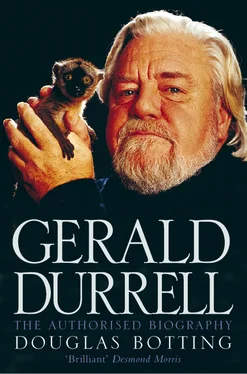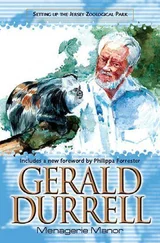‘This was the beginning of the best bout of sandfly fever I’ve had to date,’ Gerald wrote reassuringly to Mother. ‘It’s bloody awful: it doesn’t kill you, or harm you in any way, but while you’ve got it you feel quite sure you’re going to die. You walk as though you are dead drunk, and everything further away than ten feet is blurred and out of focus. You sweat like Hell and your head feels about four times normal size.’
In this condition Gerald now faced the prospect of a five-hour trek through the bush under the blazing equatorial sun. Leaning on the faithful Pious, and tap-tapping along with the aid of a stick, the ailing young white man shuffled along behind a column of sixty black carriers, half of them women. At the first small river he came to he had to be carried across by an elder who had come along to say goodbye. ‘Nearly I cried when I see you carried,’ Pious told him. ‘I make sure you going to die then.’ The track steepened after that, running up a hill at a gradient of one and three, and Gerald had to be half-dragged and carried up by Pious. The main column marched on till it was out of sight. ‘Every two hundred yards we would stop for five minutes,’ Gerald recalled, ‘while I sank down on the path and sweated like a hero in a film and Pious fanned me with a hat.’
One way or another, Gerald got to Mamfe by half-past ten, and by two he was eating lunch with John Yealland at Bakebe. The reunion was heartfelt. Gerald had formed a high opinion of John’s qualities as an ornithologist and a man, relishing his slow drawl and dry humour, his wisdom and kindness. It was a pleasure to be with a fellow-countryman again, to speak plain English, swap the news of the last few months, and inspect each other’s impressive collections of birds and animals.
After three days’ rest at Bakebe, Gerald began to feel much better, only suffering from the disappointment of not having got an angwantibo. This disappointment was to be short-lived. One day, not long after his return to Bakebe, Gerald set off for a reconnaissance of the nearby mountain N’da Ali, which had almost sheer sides thickly covered with forest. Gerald’s aim was to find a camp site and to spend ten days or so trying to catch some of the large numbers of chimpanzees reputed to live there. He wrote home:
I set off early one morning on a borrowed bike, a small boy on the crossbar with a bag of beer and other nourishment, to meet the hunter who was going to lead me up. We had gone about four miles, and I was just wondering if my legs were going to hold out, when in the distance I saw a man marching along with a bag made out of palm leaves in his hand. Thinking it was yet another Pouched Rat or Brush-tailed Porcupine, I dismounted and waited for him. When he got near I saw to my surprise that he was one of my ex-hunters from Eshobi. When he got to within hailing distance I asked him what he had got, and he replied that it was small beef. I regret to say that on peering into the basket the only sound I could produce was a sort of strangled ‘Arrrrr …’ Then I loaded the hunter with my gear, threw the boy off the crossbar, and hanging the Angwantibo round my neck fled frantically back home again.
Gerald had obtained his first angwantibo in the nick of time, for shortly afterwards there came word from England – a tip-off from his Whipsnade friend Ken Smith – that the legendary collector Cecil Webb of the London Zoo had set sail for the Cameroons with the express intention of catching angwantibo. A veteran of expeditions all over the world, Webb regarded Durrell and Yealland as novices and upstarts. For their part, they saw him as an irritating rival who was over the hill.
Eventually, Webb caught up with them. ‘He is a huge, lanky man (six foot six, I believe),’ Gerald reported to Mother, ‘with a protruding jaw and faded blue eyes. We found him clad in faded blue jeans and an enormous sort of straw sun-bonnet which made me want to giggle. He asked, with a careless air that almost strangled him, if we had still got the Angwantibo, to which we replied that it was thriving. I am going up to Bemenda in a few days time and will pass through Mamfe, where he is now. I shall then take great pleasure in telling him that we have now got three (3) Angwantibo!!!!!!!!’
Webb did not go away empty-handed, however, for Gerald was duty bound to hand over to him for delivery to London Zoo the most remarkable animal in his collection – Cholmondeley (pronounced Chumley) the chimpanzee. Gerald had acquired Cholmondeley from a District Officer who had asked him if he could find a home for a chimp at London Zoo. Gerald had agreed, imagining that the creature would be about a year old and around eighteen inches high. He was amazed when a lorry arrived with a large crate in the back containing a full-grown chimpanzee of eight or nine years of age, with huge arms, a bald head, a massive, hairy chest that measured at least twice the size of Gerald’s, and bad tooth growth that made him look like an unsuccessful prize-fighter.
I opened the crate with some trepidation. Cholmondeley gave a little hoot of pleasure, gathered up the long chain which was attached to a collar round his neck, hung the loops daintily over his arm, and stepped down. Here he paused briefly to shake my hand in the most regal and dignified manner before walking into the house as if he owned it. He gazed around the living room of our humble grass hut with the air of a middle-European monarch inspecting a hotel bedroom suspected of containing bed bugs. Then, apparently satisfied, he ambled over to the table, drew out a chair and sat down, crossing his legs and staring at me expectantly.
We stared at each other for a bit, and then I got out my cigarettes. Immediately Cholmondeley became animated. It was quite obvious that after his long journey he wanted a cigarette. I handed him the packet, and he removed a cigarette, carefully put it in his mouth, and then replaced the packet on the table. I handed him a box of matches, thinking this might possibly fool him, but he slid the box open, took out a match, lit the cigarette, and threw the matches back on the table. He crossed his legs again and lay back in his chair inhaling thankfully and blowing great clouds of smoke out of his nose.
Cholmondeley had other predilections. Hot, sweet tea was one. He would drink it out of a battered mug the size of a tankard, balancing it on his nose to drain the last dregs of syrupy sugar at the bottom. Then he would either hold out the mug for more or hurl it as far away as he could. He had also developed a fondness for beer, though Gerald only proffered it to him once, when he drank a whole bottle very quickly, with much lip-smacking and delight, till he was covered in froth and began to turn somersaults. After that he was given nothing stronger than lemonade or tea. Gerald parted with this extraordinary character with much regret, though he was destined to meet up with him again soon enough.
At last, in July, the time came to wind down operations and pack up the expedition. The rains were beginning, and Gerald had run out of money. He had spent heavily on stores, staff and accommodation, but especially on the birds, animals and reptiles which made up his huge collection. The situation was dire enough for him to swallow his pride and telegraph home for a loan, receiving by return the sum of £250 (more than £5000 in today’s money) from Leslie’s girlfriend Doris, the off-licence manageress.
The remaining camp stores were sold off, as John Yealland recorded in his diary:
Gerald started to sell up the home this evening and did a brisk trade with his topee and umbrella and my oilskin, along with two sacks of maize, half a sack of coconuts, crockery, pots and pans and some spare cartridges. Such was Gerald’s salesmanship that he even sold an alarm clock which never lost less than one and a half hours in twenty-four for 15 shillings. He also sold a watch which he dropped on a concrete floor at Victoria and which still ticks though it doesn’t move its hands. So now we dine off cracked plates, but at least we have some money for cables to Belle Vue and Chester Zoos.
Читать дальше










